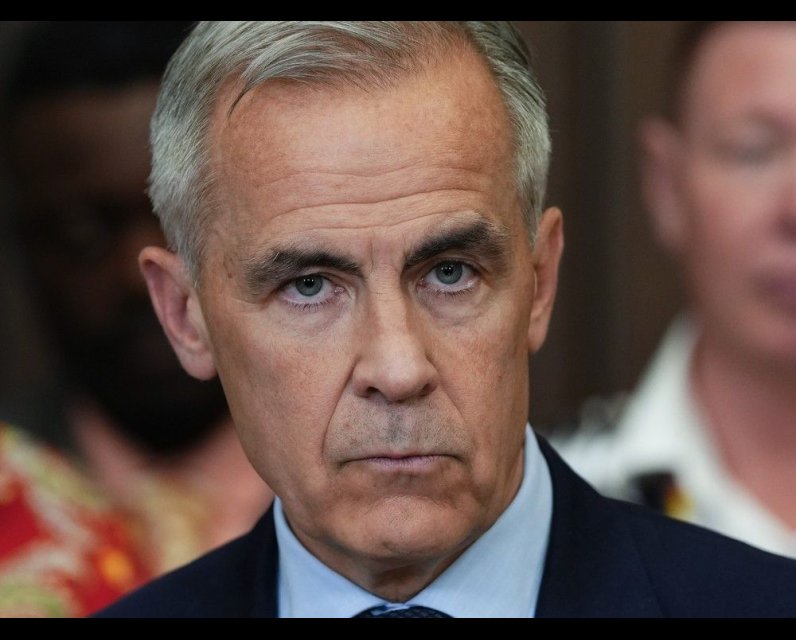Carney pitches major project powers to skeptical First Nations as advancing 'Indigenous economic growth'

GATINEAU, Que. — Prime Minister Mark Carney entered a high-stakes meeting with First Nations leaders Thursday, touting his government’s new law to fast-track major infrastructure projects as having “Indigenous economic growth” at its heart, saying he believes consensus can be reached on how to move forward.
Whether Carney’s pitch lands with the more than 200 chiefs and other First Nations leaders who attended the gathering remains to be seen, given the vocal pushback the law, known as Bill C-5, has received over concerns about its impact on First Nations’ territories and the legal obligation the government has to consult communities.
“I don’t think … that a lot of people are happy right now in terms of the way that the government has gone about ramming through legislation without respecting the current … protections within the environment, the current protections on our water,” said Southern Chiefs’ Organization Grand Chief Jerry Daniels.
Chiefs who attended the gathering came armed with concerns and questions about the government’s new law, which ushers in a new process for approving major infrastructure projects from ports to pipelines. It aims to bring down the federal approval process necessary for projects to receive the green light to two years, down from the current five.
Introducing and passing what Carney coined as his “One Canadian Economy” bill fulfilled a campaign promise he made during the spring federal election, where he pledged to remove all federal internal trade barriers by Canada Day and get more large infrastructure projects off the ground to bolster Canada’s economy against U.S. President Donald Trump’s tariffs.
Even before it was introduced, the Assembly of First Nations, the main advocacy organization representing more than 600 First Nations across the country, voiced concerns about the lack of involvement of Indigenous-rights holders in developing the bill, which it said directly impacts communities that have a constitutional right to be consulted before projects get approved.
Carney, who announced he would meet with chiefs in response to their concerns, has promised that the government would properly consult, as it decides on which projects would be deemed as benefiting the “national interest.” Those that Carney’s cabinet deems to be would be added to a list and qualify for the faster approvals process, to be coordinated through a yet-to-be-established major projects office.
Before Thursday’s meeting got underway, Carney told reporters they are not yet at the stage of picking projects, but at the beginning stages of hearing from First Nations leaders about how best to proceed.
“Today is about the how, not the what,” the prime minister said, who added that he planned to focus on listening.
Assembly of First Nations National Chief Cindy Woodhouse Nepinak has acknowledged she has heard a diversity of opinion from chiefs about the law, with some in support of having more major resource projects built, while others stand opposed.
Asked whether he believed consensus was achievable, Carney said, “Yes, I do.”
“That’s the purpose of having a discussion, because this is the first step of a process.”
Carney is set to meet at a later date with Inuit and Metis leaders.
He used his opening remarks on Thursday to highlight how he sees the powers ushered in through the new law as opening the door for more economic opportunities for First Nations, saying that a “new chapter” could be written in the relationship between the federal government and communities.
“One of the points is that the economic value of these projects will be shared with First Nations as partners. You will help build the prosperity of your communities for generations to come.”
“In many respects, this is the first federal legislation to put Indigenous economic growth at its core. We now have the opportunity to realize it.”
Indigenous participation is one of the criteria Carney has pledged the government will use in determining what projects would be considered in the national interest.
The planning for Thursday’s meeting was done by the Privy Council Office, the arm of the government that supports the Prime Minister’s Office.
The agenda for the day included panels on the issue of “meaningful consultation” as well as a discussion around the Indigenous advisory council that the government has committed to appoint.
Besides Carney, senior ministers speaking at the closed-door event included Intergovernmental Affairs Minister Dominic LeBlanc and Indigenous Services Minister Mandy Gull-Masty.
Some chiefs expressed frustration at only receiving the agenda late Tuesday, given that leaders had been invited to briefings about the legislation from senior government officials.
Paper copies of a slide presentation prepared by the Privy Council Office, which were available to Thursday’s attendees, showed the government had heard there was “inadequate time to consult” about the new bill and the “importance of respecting Indigenous rights,” as well as the United Declaration on the Rights of Indigenous Peoples.
The media itself was not permitted to cover the discussions and was instructed to leave the building by departmental staff following the prime minister’s opening remarks.
Having the gathering in the first place was pitched by Woodhouse Nepinak, who used her opening address to the chiefs gathered to highlight ongoing challenges First Nations face when it comes to a lack of adequate infrastructure in communities, from housing to clean drinking water, as well as past legal challenges Ottawa has faced when it has not properly consulted Indigenous communities.
She highlighted in her speech, a copy of which was circulated to media, that it was “not clear” to First Nations what the government was intending when it came to speeding up the building of major infrastructure projects and that “until an appropriate process is established with First Nations rights holders and founded in free, prior and informed consent, the Crown’s legal obligations can not be met.”
Woodhouse Nepinak told reporters afterwards she wants Carney to make solid commitments, including to stage another gathering with chiefs next year.
Our website is the place for the latest breaking news, exclusive scoops, longreads and provocative commentary. Please bookmark nationalpost.com and sign up for our daily newsletter.
Our website is the place for the latest breaking news, exclusive scoops, longreads and provocative commentary. Please bookmark nationalpost.com and sign up for our politics newsletter, First Reading, here.



Comments
Be the first to comment